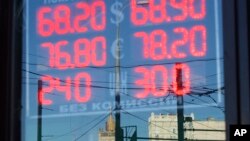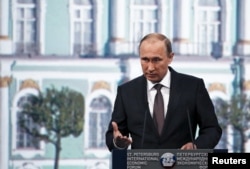Russian President Vladimir Putin gets a bad report card, even a failing grade, for his handling of the economic crisis in his country, according to 27 percent of analysts who participated in a major survey conducted by Bloomberg Business.
These are hard times in Russia, with the collapse in oil prices, economic sanctions against the country for its actions in Ukraine, the collapse of the ruble and significantly impaired economic growth.
Russia's growth started to decline rapidly in the first quarter of 2012, well before oil prices fell or economic sanctions took hold. The World Bank estimates that by 2017, Russia's GDP will be smaller than it was in 2012.
Russia's former finance minister, Alexei Kudrin, says he believes the economy is likely to decline in 2016, although he thinks growth is possible in 2017.
Others see growth even earlier.
"The worst, I think, is over at this point,” said world-renowned Russian expert Timothy Frye of Columbia University's Harriman Institute. “From 2012 to 2015, economic growth in Russia decelerated at a rate of around 1.5 to 2 percent a year. The last quarter, we've seen the economy start to stabilize and adjust to the new reality of lower oil prices.
"So, although the consensus forecasts are for around zero or around 0.5 percent or maybe 1 percent growth in the coming year, what's really concerning about the economy going forward is that nobody is predicting rates of economic growth beyond 1 percent, 2 percent, barring some really significant change in government policy," he added.
Frye believes that people don't expect those government policies to change very much because they would come at great political cost.
Government pressure
So what to do about it?
There has been a lot of arm-twisting by the Russian government to have major industries, such as Gazprom and Rosneft, limit their foreign currency holdings to help prop up the ruble.
The government also has been pushing for help from the oligarchs who have made billions — primarily in the oil and gas industries — since they were privatized.
But many interest groups in Russia have distinctly different views about nationalization in the economy, said Frye, who also teaches at a university in Moscow.
"There are a lot of Russian companies that are suffering because of the sanctions,” he said, “but there are also some companies in Russia that are benefiting from Russia's turning away from the global economy. For example, agriculture is a sector that has benefited somewhat from the ban on European food goods being brought into Russia, and they've experienced some moderate rates of economic growth."
Investing across borders
This also applies to private foreign investment.
For many Russian billionaires, there has been no better investment than real estate in London, New York and Paris.
Hundreds of millions of dollars have left Russia and wound up in apartments and condos, especially in New York's strip of high-rise buildings along 57th Street and in the Time Warner Center. Many are absentee landlords who use the properties for rental income.
According to one report, Russian billionaire Dmitry Rybolovlev paid $88 million for a penthouse just off New York's Central Park. Neighbors complain that such a purchase by foreign investors drives up real estate prices in cities the purchasers have no intention of living in.
Ed Mermelstein, an international investment lawyer, helps Russian oligarchs in their quest for investments in New York — primarily real estate.
His view is that the Putin government is putting pressure on people who are moving money out of Russia.
"The idea [of the Russian government] is to, in many cases, repatriate much of the funds that have left Russia,” he said. “In many cases, the way they have left the country is not something the government was very happy about in hindsight."
It is clear, however, that new money is not leaving Russia, Mermelstein added.
Putin's poll ratings are still sky-high in Russia. But if the economy continues to drag, such high poll numbers could be short-lived.






